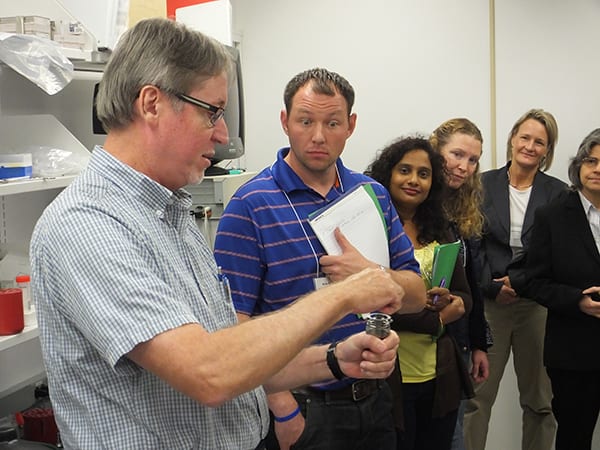News
Why Teachers Spend Their Vacation Days at BTI

Prof. Gary Blissard explains baculovirus research with Rick Rutherford, Arti Jewett, Holly Stekl and Gina Duggleby.
The Finger Lakes region is a beautiful place to vacation, but instead of taking selfies at waterfalls, a group of New York state teachers came to Ithaca over Columbus Day weekend to learn about the latest advances in plant and insect science.
A group of fifteen middle school, high school and community college teachers gathered for an action-packed, two-day workshop at the Boyce Thompson Institute, which included seminars and demonstrations on plant epigenetics—the study of inherited information superimposed on the genetic sequence—and a group of viruses that infect insects, called baculoviruses. Organized by BTI’s Education and Outreach department, the activities bring cutting-edge science into the classroom, to enhance the teacher’s existing lesson plans.
“As a science teacher, you don’t get professional development in science most of the time,” said Kelly Mackey, a high school teacher in Islip, NY. “You get it in education, but to actually learn about what’s going on in the field of science is a unique opportunity.”
The Education and Outreach department’s Center for Plant Science Teaching and Learning has considerable experience creating meaningful professional development programs for teachers.
“A cornerstone of that development is designing programs where teachers not only learn new science content, but also have varied opportunities to apply new learning over time, to make improvements to our curriculum materials and share their results with scientists, teachers and other colleagues,” said Director of Education and Outreach Tiffany Fleming. “These projects are very collaborative and really take form over time with the expertise of all those involved.”
The workshop combined alumni teachers who have successfully used BTI projects in their classroom with teachers who are new to the program. Some attendees, including Mackey, have attended BTI teacher activities for years.
“It’s beneficial for us and the teachers to have an ongoing relationship with BTI,” said teaching lab coordinator Becky Sims. “Alumni teachers are an inspiration and a resource for the teachers who are coming to our programs for the first time. By sustaining relationships with teachers, we can stay informed about the current issues and challenges in education. We also have an opportunity to get to know a teacher and their classroom and see how BTI programs impact STEM students over time.”
Besides providing lesson plans and feedback, Mackey has also given back to the researchers, with the help of her students. She taught the “Discovering Epigenetics: It’s a bal!” project with her class—an activity based on the research of BTI Professor Eric Richards where students grow seeds of plants that are highly susceptible to mutations, due to a reduction in DNA methylation, a chemical modification of the hereditary material. She sent seeds from a mutant plant back to the Richards lab. After the lab sequenced the genome of the plant, they found several new mutations where stretches of different regions of the plant’s DNA were duplicated and rearranged.
Now Mackey, and other workshop attendees, are creating curriculum for a new Education and Outreach activity based on research in Professor Gary Blissard’s lab on baculoviruses. The lesson explores how the virus moves from plant leaves to the insect’s gut and into the surrounding tissues where it reproduces and kills off its host. Baculoviruses can be used for insect control in agriculture and in gene therapy techniques to one day treat genetic disorders.
“I was fascinated by the science,” said Mackey. “I’m working on a lesson to help teach some of the things about the virus life cycle that have not yet made it into the high school curriculum.”
Peter Hentschke, who teaches ninth grade biology, and a senior environmental science elective at the Harley School in Rochester, NY, is also interested in using the baculovirus lesson in his classroom.
“I’m really excited to see that project develop. The context is so rich and so cutting edge, dealing with disease transmission, it really gets the kids connected to real-world science,” he said. “[The workshop] was just really engaging and got you excited to spin it into your classroom.”
To further support the teachers in implementing the activities in their classroom, BTI gives new teachers NSF-supported, BTI-developed experiment kits that are full of classroom research materials. The teachers are encouraged to submit lesson plans, tailored to their classrooms, following the workshop.
Even though Sims had to give up her Saturday to teach the workshop, she says it’s worth it to be working with such dedicated and enthusiastic teachers.
“It takes a certain type of person to say, ‘you know what I’m going to do on my long weekend, is go to a workshop and learn about plant research so that I can benefit my students,’” said Sims. “The fact that that’s not only how they chose to spend their weekend, but they were very excited about doing so is kind of humbling. I’m excited to keep working with them to develop these classroom projects.”
To learn about future teacher workshops and institutes or to get involved with the Center for Plant Science Teaching and Learning, visit the BTI Education and Outreach website.

